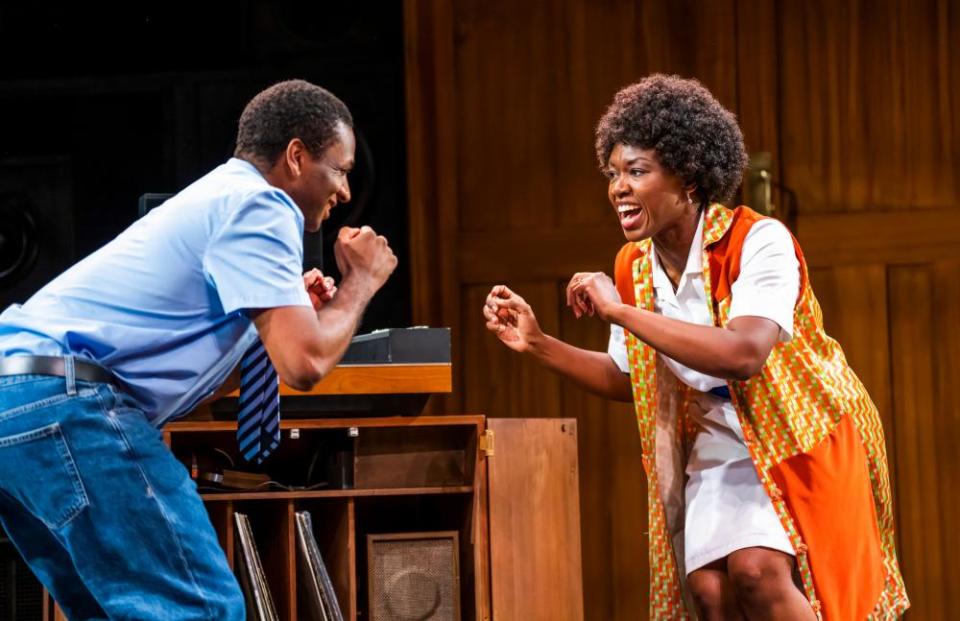The week in theatre: Closer, The Tempest, The Darkest Part of the Night – review
This year marks the 25th anniversary of the opening of Patrick Marber’s Closer and reveals the play to be as good as new – with all its cruelty, humour and desire intact. Men, in Marber’s world, are from some twisted version of Venus, while women are from planet Earth and more emotionally evolved than their lust-crazed male counterparts. It’s a dark, undeceived or cynical piece (depending on your point of view) that recalls Pinter’s Betrayal or an English version of Schnitzler’s La Ronde – except that it is more vicious oblong than circle and without the reference to class. A piece about a quartet of tormenting and tormented lovers, the only way in which the 1997 play – also a 2005 film – shows its age is in the atmosphere of its internet chat room scene, which seemed novel in the original.
The new production is directed by Clare Lizzimore with style, and Soutra Gilmour’s spare red-and-black set is designed with musicians in mind, as if an intense gig were about to get under way, which, in a sense, it is. Arun Ghosh (musical director and arrangement) and Radhika Aggarwal play insinuatingly: their music is the food of love, severance and betrayal. Ella Hunt dazzles as Alice – a beautiful, scruffy siren with mauve hair and ripped tights who sings like a delicate sister to Chrissie Hynde. Jack Farthing is great as Dan, a weasly, entitled, self-pitying chain-smoker who works “in the Siberia of journalism” on the obits page and whose joke – “It’s a living” – flops lifelessly. Anna is a poised photographer who never lets her own image slip – lovely work by Nina Toussaint-White. The dialogue is poised, no matter what the mood. When Alice asks Anna, just after she has taken photos of Dan: “Did you steal his soul?”, Anna replies: “Would you like some tea?” The words in each sentence are evenly weighed, to comic perfection, as though their meaning were exactly equivalent.
Ciarán O’Brien is one of the best Calibans I’ve ever seen: a terrified little Irishman in a ripped Hawaiian shirt
“Thank God life ends – we’d never survive it,” remarks Larry, the brilliantly funny and floundering consultant dermatologist with a hit-and-miss bedside manner. Sam Troughton carries the show in the role and is brilliantly funny as he undergoes many undignified humiliations before discovering that love is more than skin deep.
The Globe’s august, sealing-wax red pillars have sprouted palm leaves, and this is the first hint of enjoyable liberties ahead. Sean Holmes’s production of The Tempest nods and winks at Love Island, and Shakespeare proves accommodating as always. Ferdy Roberts’s entertaining Prospero is an intemperate old beach boy who talks too fast in tight, sunshine-yellow swimming trunks. This is a show that abjures magic, trading it in for nicely engineered laughs. It’s an enjoyable party piece but high-risk to turn Prospero into a figure of fun, because while you scale back the role’s often tiresomely portentous aspect, you also scrap power, mystery and what Shakespeare describes as “sea sorrow”.
Nadi Kemp-Sayfi plays Miranda nicely in an orange figure skater-type outfit – more local talent than romantic lead. Rachel Hannah Clarke’s Ariel is a charming girl in a sailor suit, but more about earth and water than air – her feet never leave the ground. Ciarán O’Brien is one of the best Calibans I’ve ever seen: a terrified little Irishman in a ripped Hawaiian shirt who manages to smuggle a plaintive lyricism on to the island. There are winningly comic performances from George Fouracres as Stephano, a dapper sailor in long white socks with a capsizing gift for understatement, and Peter Bourke as Gonzalo, a pukka civil servant type who has the audience eating out of his hand with a posh commitment to whatever it is he has to say.
You wouldn’t want every Tempest to be as breezy, but there is a fine clarity to the lighthearted storytelling. In particular, it reminded me of the extent to which this is a play about dredging – about weird and not always wonderful human finds, washed up by the sea and needing to be scrutinised, pondered over and understood.
Zodwa Nyoni’s new play The Darkest Part of the Night has an autistic young man at its centre. Dwight, first encountered growing up in 1980s Leeds, is hearteningly played by the excellent Lee Phillips, who we see dancing joyfully to Stevie Wonder as if in another world. We see how often he blocks his ears against hurtful noise. And we watch him caress his mother’s handbag as if he could conjure her precisely through the softness of the suede.

Above all, this is a celebration of a far-sighted mother who, before having received a diagnosis of her son’s condition, understands what he needs. Josephine is triumphantly played by Nadia Williams – a Yorkshire-Jamaican Mother Courage. This is a heartfelt play slowed down by overextended storytelling and erratic flashbacks. Nyoni is trying to do too much: she seeks to address a cluster of issues simultaneously – racism, the state of the NHS, the tensions in a marriage – and the result is a lack of traction. Yet the scene in which Dwight and his sister Shirley (Nadia Williams, again) comfort one another at their mother’s funeral, standing next to MUM – a chubby white and satiny purple floral tribute – makes a moving ending, and Nancy Medina shows herself to be a sensitive funeral (and all that leads up to it) director.
Star ratings (out of five)
Closer ★★★★
The Tempest ★★★★
The Darkest Part of the Night ★★★
Closer is at the Lyric Hammersmith, London, until 14 August
The Tempest is at Shakespeare’s Globe, London, until 22 October
The Darkest Part of the Night is at the Kiln, London, until 13 August


